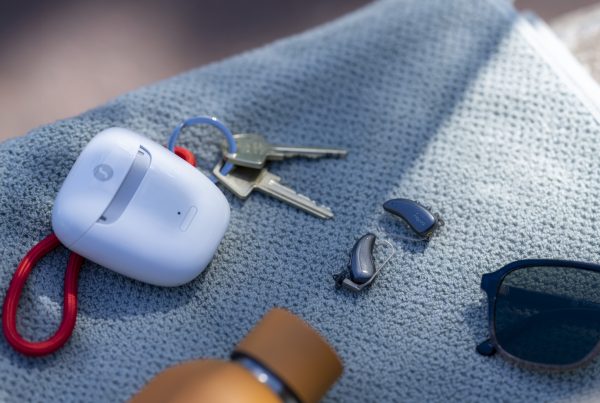Hearing loss can affect us at different stages of our lives, including when we are at work. In fact, it is estimated that approximately 4.4 million people are of working age and living with some form of hearing loss in England.
Managing hearing loss at work can be tricky and may feel isolating if you are working without accommodating measures in place. You shouldn’t have to suffer though! In this article, we’ve put together some advice that we hope can help whether you’re experiencing hearing loss yourself or wanting to help an employee or co-worker.
Don’t suffer in silence
If your hearing loss impacts you at work, it’s important to speak up to ensure you get the help and adjustments you need. Organise a chat with a member of management or HR that you feel comfortable talking to. Explain to them how your hearing loss affects you at work and some of the measures you think could help – we’ll discuss these in more detail later in this article! You could also mention any upcoming audiology appointments or give them a rough timescale for how often these might be if time off is required.
You might feel worried about taking this first step, but we’re sure your employer will be keen to help. Remember, your hearing loss doesn’t define you and doesn’t need to prevent you from being the great employee you are!
Once your employer knows, you might also want to disclose your hearing loss with your co-workers. This should put your mind at ease if you need to ask them to make accomodating for your hearing difficulties. Employers may consider deaf awareness training to help make the entire team aware of how they can help.
Modifications to your work environment
We understand that hearing loss can affect your working life in almost any job. Therefore, we hope the following tips can be adapted to many workspaces and are useful to both employees and employers looking to make their working environment a more accessible place for those with hearing loss.
- Adjust the layout of any meeting rooms and use good lighting so that everybody can be seen clearly. This is helpful for those who rely on lipreading.
- Use soft furnishings such as rugs, and install acoustic panels to prevent echoing or unnecessary background noise.
- Try to avoid background noise as much as possible, for example, air conditioning units, projectors and music. If unavoidable, position yourself somewhere that is least affected by this.
- Try to encourage colleagues to speak one at a time, or move to a separate room for loud conversations.
- If you find talking on the phone difficult, try to organise face-to-face meetings where possible. For tips on hearing better on the phone, take a look at our recent article.
Helpful technology and equipment
If you use the phone often at work, there are many devices that can help make this a little easier. This includes hearing aid compatible telephones or captioned telephones which translate the speech into words on a screen.
If you’re often in meetings, speech to text reporters may help by providing a transcript of what has been said. You could also ask a co-worker to provide you with their meeting notes to ensure that you haven’t missed anything. Or, you may want to send an email to the team yourself, to summarise the task’s requirements and provide reassurance that you are on the same page!
As an employer, it is important to do as much as possible to keep your employees safe whilst at work. On the occasion where an employee experiences hearing loss, we suggest fitting visual alarms. An example of this is a fire alarm with a light as well as sound, to ensure their safety. You should also provide adequate ear protection for all employees in workplaces where noise is particularly loud e.g., construction.
As an employee, it’s important that you do your bit to manage your hearing loss too. This includes attending regular hearing aid appointments, keeping backup batteries on hand, and making your audiologist and employer aware of any changes to your hearing.
Hearing loss doesn’t need to hold you back at work! We hope that these tips have shown just how many options there are for modifying your workplace to create a more accommodating environment. If you’re struggling to hear at work, our expert audiologists will be happy to offer help and advice. Get in touch with us at info@countyhearing.co.uk or call 01277 264938.









Recent Comments